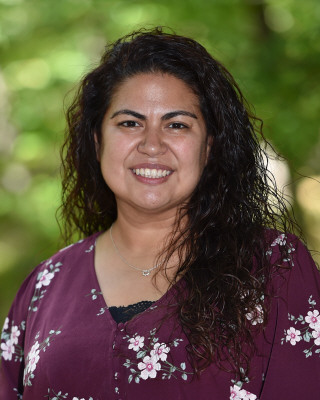
Nov 10, 2020 | Eva Schiller, New Faculty
By Eva Schiller (VI) The Pingry College Counseling Office is thrilled to welcome Cynthia Santiago to their team!
Mrs. Santiago graduated from Muhlenberg College in 2001, with a Bachelor of Arts in Psychology. She later joined the Muhlenberg Admissions staff, where she served as Senior Associate Director of Admissions and Coordinator of Multicultural Recruitment.
When asked what inspired her to switch to college counseling at Pingry, Mrs. Santiago explained, “I recruited for Muhlenberg at Pingry. I always loved my time coming here and held in high regard the students that I would meet here. So when it came time to think about leaving admissions, it was important for me to find a place that had a good community, and Pingry fit that bill!”
Now a few months in, Mrs. Santiago has made herself an integral part of the community. In addition to co-advising with Mrs. Morales of the Admissions Office, she has gotten involved with Pingry’s Latinex Affinity Group. “I’m open to any other opportunities!” she added, smiling. In the coming weeks, she hopes to “get to know as much as possible,” despite the various challenges that COVID-19 is posing.
When she’s not at Pingry, Mrs. Santiago has plenty of hobbies to keep her busy. “I crochet, and if I’m not doing that, I also spend time with my family,” she remarks. “I’ve got two little ones, and we do bike riding, hiking, and other outdoor activities as much as we can.”
Describing her experience thus far, she exclaimed, “I love it! It’s been great! Everyone is so friendly and very welcoming, and I love that I’m part of the community.” She would also like to remind the student body one last thing: “My door is always open!” Welcome to Pingry, Mrs. Santiago! We wish you the best.
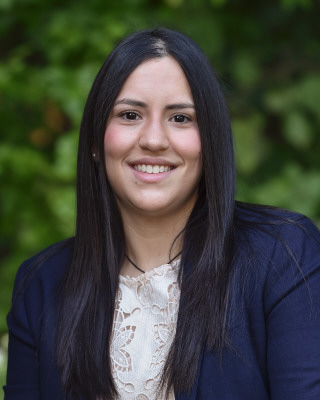
Nov 10, 2020 | Eva Schiller, New Faculty
By Eva Schiller (VI) This year, the Lower School Faculty is welcoming Ms. Gabriela Reyes as a K-3 Spanish teacher!
Ms. Reyes attended Universidad Metropolitana in Caracas, Venezuela, where she received a Bachelor’s Degree in Education. Since then, she has obtained five years of hands-on teaching experience, including her most recent position as a Lower School Spanish Teacher at Leman Manhattan Preparatory School. Speaking on her past experiences, Ms. Reyes said she has “had the incredible opportunity of instructing a diverse group of students, as well as working extensively in several school settings.”
At Pingry, her “main objective includes engaging students with various learning needs through enhancing their Spanish skills in the advanced level of proficiency in speaking, reading, writing and listening.” She also hopes to “help students fulfill their potential, support the development of a new language in children by offering new working strategies,” and help her students “understand and appreciate the cultural diversity.”
Outside of the classroom, Ms. Reyes has a variety of hobbies and interests. “I love outdoor activities, especially playing volleyball at the beach, cooking, and baking cakes to share quality time with family and friends,” she remarks. She is also a fan of Harry Potter.
Welcome to the community, Ms. Reyes!
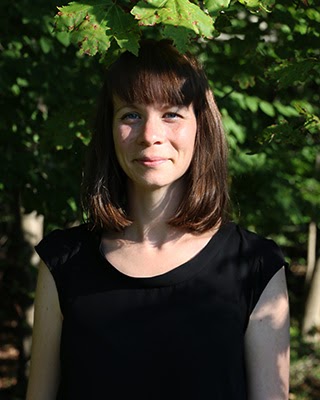
Nov 10, 2020 | Mirika Jambudi, New Faculty
By Mirika Jambudi (IV) This fall, the Pingry community welcomes Dr. Feeley to the Upper School English Department, where she is teaching English 9, American Literature, and American Perspectives.
Dr. Feeley obtained her Bachelor of Arts at Cornell University and her Doctorate in English at Duke. After finishing her Ph.D., she taught history, literature, and American studies at Harvard University at the collegiate level for three years.
Before arriving at Pingry, she was a teacher at the Northwest School in Seattle, Washington. There, she taught the interdisciplinary humanities, combining history and literature. Dr. Feeley remarks that she has “always had a love for literature.” Even in high school, she was drawn to academia because she “wanted to discuss literature with people who were also engaged and interested in thinking about it.”
So far, Dr. Feeley loves Pingry. “The Pingry environment and community members have been very welcoming, and I am excited to get to know all my students this year,” she remarked. Her goals for this year at Pingry are to create an anti-racist community in her classroom, and to “bring in practices of equity and inclusion.” She hopes to promote an environment where students feel safe, welcomed, and encouraged to participate.
When she’s not teaching, Dr. Feeley likes to spend time with her family, in nature, and in her garden—where she is experimenting with growing a variety of plants. She is also an avid hiker and is excited to explore New Jersey trails!
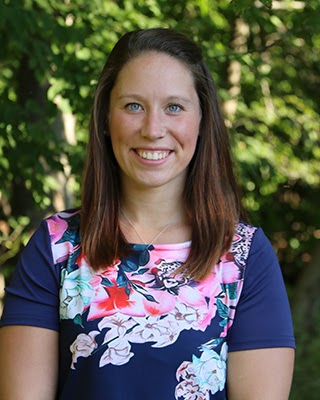
Nov 10, 2020 | Emma Drzala, New Faculty
By Emma Drzala (V) The Pingry community welcomes Ms. Deanna Fischer to the Lower School faculty. Ms. Fischer joins the Lower School to teach fourth grade social studies and reading, as well as serve as an associate teacher and co-teacher to the Lower School’s mathematics specialist, Verna Lange.
Prior to teaching at Pingry, Ms. Fischer was a co-teacher to second grade students at Shongum Elementary School in Randolph, New Jersey, for three years. She has a Bachelor of Arts degree in sociology with human services and is currently working toward getting her master’s degree in P-3 Curriculum and Instruction at Montclair State University.
Ms. Fischer made the decision to join the Pingry community after she babysat two previous Pingry students and witnessed their enthusiasm and love for Pingry. Ms. Fischer heard of the school’s culture and camaraderie and decided to join the community. When she learned of the open position of an associate teacher, she felt as though she would “learn and grow as a teacher in this role.”
When she’s not teaching or studying for her masters, Ms. Fischer enjoys exercising, reading, and exploring nature. The Pingry community looks forward to the start of her journey at Pingry!
Nov 2, 2020 | Featured, Meghan Durkin, School News, Sidebar News
By Meghan Durkin (VI)
This year’s freshman retreat, held on Thursday, September 3, kicked off an unprecedented school year. Instead of visiting Bryn Mawr Mountain Retreat as originally planned, this year’s retreat was held at Pingry to respect coronavirus guidelines. Although masks and shields brought an unusual element to the retreat, the goal of the day remained the same: provide freshmen an opportunity to interact with their classmates, as well as their peer leaders, before the official start of the school year.
Leading up to the retreat, this year’s 36 peer leaders met to prepare during a retreat of their own. They participated in bonding activities, found out who their co-leader was, and created various icebreaker activities for the freshman. Typically, the freshman retreat is planned by Bryn Mawr; however, this year, the activities were left to the peer leaders. As a group, they brainstormed ideas such as “icebreaker UNO” and Jeopardy.
With all that preparation, Thursday kicked off with a quick coronavirus safety briefing by Mr. Graham Touhey and an introduction to the peer leaders. Then, each peer group, consisting of about eight freshmen and two seniors, went off to get to know each other. Each group did their own activities, from charades and kickball to Jenga and “Shark Tank.”
The day did bring many new challenges, as this was the largest number of students on campus since March. Peer leader Zara Jacob (VI) described these difficulties: “There were quite a few bumps and some moments where the last thing I wanted to do was talk with my mask on, but I still got to meet my freshmen in-person. I got to know them on a level you just can’t through a screen.”
Like many others, Jacob was able to make the most of the day, even though it was different than anticipated. Her favorite activity was the peer leader hunt: each peer group and one of their leaders used clues to find the other leaders hidden throughout the building and campus. “When I was with my peer group, we were all just walking together, listening to music, and talking,” Jacob recalled.
Throughout the day, the peer groups also competed in a TikTok challenge. These videos had to reflect how they hoped to be defined as a group; at the end of the retreat, all the TikToks were viewed in Hauser and voted on. Ultimately, this challenge allowed the groups to explore their creativity and work together.
While this year’s retreat still allowed freshmen an opportunity to get to know each other, the traditional overnight retreat was missed by all. Ms. Lorian Morales, one of the peer leadership advisors that helped plan the retreat, acknowledged those disappointments: “Having that time away together, whether it’s on the bus, walking the trails, sharing meals, or hanging out in the cabins, allows students the opportunity to interact at their own pace in a relaxed environment.”
However, the retreat’s unusual elements brought many positives as well, as the Pingry community finally came back together. “Watching the day unfold put me at ease. Students were back on campus, making new friends, reconnecting with old friends, and just enjoying each other’s company,” Ms. Morales said.

Nov 2, 2020 | Andrew Wong, Featured, Summer Experiences
By Andrew Wong (V)
This past May, with the COVID-19 pandemic still raging, Noah Bergam (VI), Kristin Osika (V), Eva Schiller (VI), and myself formed an organization called Care-Full to distribute PPE to underserved communities around New Jersey. With the new health and economic challenges brought on by the pandemic, we knew many in our local communities would be struggling financially and might not have access to masks, gloves, and hand sanitizers, and this problem would only be exacerbated in the next months. Rather than sitting back and watching, we took action, creating a plan to supply these necessities to the community.
We decided to create care packages consisting of a 30 mL bottle of hand sanitizer, three individually wrapped face masks, a pair of disposable gloves, and an originally designed pamphlet on how to stay safe during the pandemic. We all drew upon our various unique skill sets and connections to accomplish this task. Noah and Eva used their publishing experience to create advertising materials, Kristin reached out to various organizations for deliveries and donations, and I organized assembly sessions at Pingry to collect PPE and make our care packages. Our combined teamwork over the course of the summer allowed us to make and donate over 1,900 care packages, while raising almost $3,500 toward the creation of more packages.
Our care packages were gladly received by many in our local community. We donated to a variety of charity organizations, such as the Interfaith Food Pantry, NourishNJ, the Visiting Nurses Association of NJ, Market Street Mission, and various other nursing homes and churches across New Jersey. Helping the community through Care-Full has been especially rewarding for the team.
As America reopens, PPE is mandatory in most public settings; those without a mask are barred from entry to stores and small businesses. Those who lack access to PPE face limited entry into these public spaces, and thus necessities such as groceries might be difficult to come by. Additionally, going to work or buying food can be stressful for those who lack proper protection against COVID-19. By providing PPE in these care packages, they ensure that everyone – no matter their socioeconomic status, risk factors, or age – can visit public locations and go outside without difficulty or fear.
To continue these vital efforts and sustain their ability to provide PPE, Care-Full needs the help of everyone in the community. The Care-Full team is currently researching ways to raise awareness in order to create and distribute more care packages. Anyone can make a monetary donation by clicking the link on their website at care-full.org, or clicking the links on our Instagram (@we_are_carefull) pages. We can also be reached via email at 2020.carefull@gmail.com. All donations go directly to the making of care packages: just $2 can supply a care package to someone in need!
Jul 17, 2020 | Aneesh Karuppur, Opinion
By Aneesh Karuppur (VI)
Some time back, I wrote a commentary regarding AP-designation courses at Pingry, and how Pingry ought to consider phasing them out. Given the events of the past few weeks, I would like to update that message: I feel that it is now imprudent for Pingry to offer AP Courses, and I hope that this transition occurs as soon as possible.
This might seem like a bit of a dramatic change––I admit that perhaps my last commentary was less vicious towards the College Board. However, the coronavirus has exposed some of the concerns that before, we could only hypothesize about. Our current situation demonstrates that the College Board is ineffective, unnecessary, and has been abusing its monopolistic status over testing.
Colleges and universities have begun showing the same attitudes towards the College Board’s standardized test products. Almost every school will be test-optional for the upcoming admissions season, if they were not already. The Massachusetts Institute of Technology announced in March that it would refuse to consider SAT Subject Tests outright for future admissions seasons as well. As colleges emphasize “holistic admissions” and considering “the whole person,” it’s clear that traditional exam-based metrics are being relegated to first-round screening of applicants rather than acting as deciding factors.
I agree wholeheartedly with those decisions. I have forgotten much of the material that I crammed for my AP World History exam last year; meanwhile, the information that I learned in Pingry’s World History 9 and 10 classes still stays with me. I have no appreciation for AP exams other than the fact that colleges take them as proof of introductory-level course completion. In fact, I feel animosity towards the College Board for their insistence that the exams demonstrate understanding rather than memorization; I have found that their exams are based around limited interpretations and memorized facts, despite their pretensions.
The coronavirus has only demonstrated how embarrassingly pointless College Board’s exams, particularly the APs, have become. The shortened 45-minute exams include a maximum of two questions, with many exams only having one single essay question. In addition, not only do this year’s exam exclude large chunks of material due to their truncated nature, but the College Board has axed the final few units from the accompanying AP Courses. Classes that strictly follow those courses learn less and still demonstrate only a fraction of that knowledge on the exam.
The College Board insists that they have worked with colleges to consider these new AP Exams as course credit, but I am extremely doubtful of that. Take the AP Physics Mechanics exam: why should any college consider a two-question exam that covers probably half of the learned units, not to mention the complete removal of orbital and simple harmonic motion, as equivalent to a full year of introductory physics? In any case, the normal AP Courses are not at the level of rigor as a college course––how could a truncated version carry any semblance of the same value? The College Board refuses to answer these questions properly or honestly.
Moreover, the College Board has done a less-than-satisfactory job of administering the online exams. Countless students––including many at Pingry––have watched their exams refuse to submit through the AP testing system. Beyond that, the College Board sent out a broken makeup test link; after outrage online, they fixed it, but didn’t bother to update anyone or even apologize. Meanwhile, they’ve been posting tone-deaf Tweets about catching cheaters, while upstanding students are left to wait several weeks just to learn whether they’re eligible for the makeup exam. And, despite the fact that the exam is a quarter of the length that it was before, College Board is charging full price ($94) and will take longer to grade the exams than normal.
All of this stems from the fact that College Board’s AP is essentially unchallenged in the market for class-based, subject-specific standardized tests. Its only competitor is the International Baccalaureate (IB) program. Most schools offer either one or the other; few offer both, meaning that most students don’t have a choice as to which advanced courses they can take. Their quasi-monopoly over such schools has allowed them to offer lower-quality products while remaining unchallenged, as it’s very difficult for a school to suddenly switch from AP to IB. While the IB program has cancelled their exams, the AP system forged ahead in their revolutionary product of mismanagement and terrible user experience.
As a final note, Pingry doesn’t benefit from boasting about the number of AP courses or exams it offers. Pingry’s curriculum highly restricts when and which AP Courses students can take. For example, all students must take the Biology-Chemistry sequence in the first two years, while other schools (including public schools) allow students to take AP Chemistry or AP Biology much earlier. Pingry doesn’t offer AP World History, AP Environmental Science, AP Human Geography, AP Research, or AP Seminar courses; for the latter two, I can’t recall a single Pingry student who has taken those exams. Thus, since Pingry already does not fully conform to the AP program, we should be able to do away with AP Courses with few qualms. If teachers can design curricula that have real-world value, rather than dedicate time to an increasingly obsolete test, all members of the community will benefit. The AP Exams can be offered as independent signups for those students who wish to take them.
The College Board has nothing to lose by remaining aloof and ignorant of students’ and teachers’ frustrations. I hope that Pingry can join other independent schools in abandoning the AP for good.
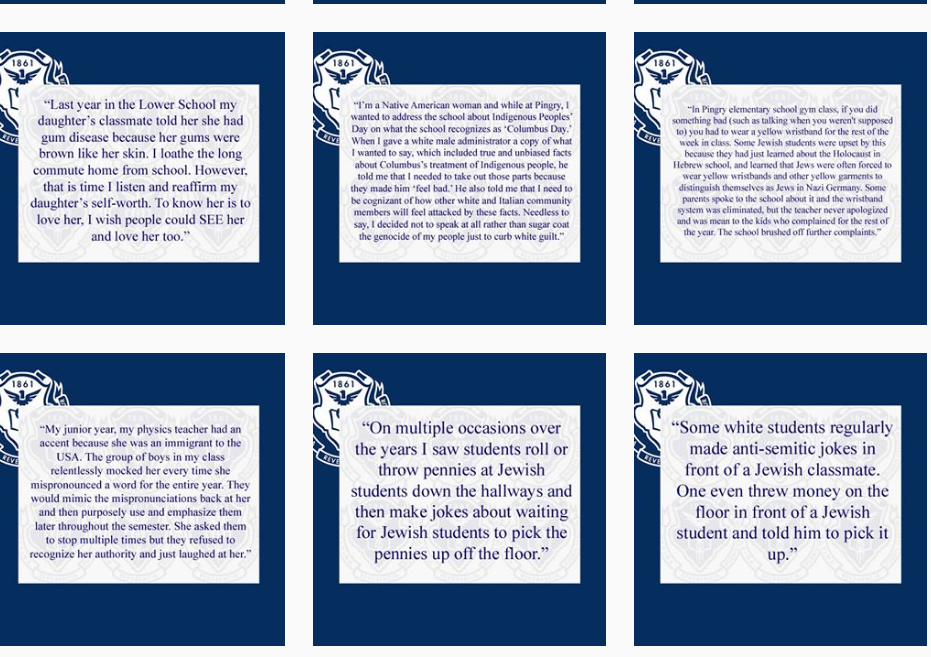
Jul 8, 2020 | Aneesh Karuppur, Front Page News
By Aneesh Karuppur (V)
In late May, the death of George Floyd at the hands of Minnesota policemen triggered a mass movement across the nation (and eventually the world) in support of Black Lives Matter.
The Record previously detailed some of the earlier impacts that this multifaceted movement has had on the Pingry community. Pingry’s leadership has affirmed its support of Black Lives Matter and of minority students. Furthermore, Pingry students have taken action by petitioning, protesting, and consistently spreading awareness.
The focus on our nation’s problems has also thrown issues surrounding race and identity within the Pingry community into sharp relief. To this end, an anonymous account known as Black at Pingry (@blackatpingry) was created. Modeled after similar accounts at other private preparatory schools (including Dalton, Lawrenceville, Exeter, Andover, Choate, and Newark Academy, among many others), this Instagram account provided an outlet for Black students to anonymously expose some of the discrimination and issues they’ve face. Within several days, the platform began highlighting instances of racism and unfairness towards other people of color, and has since expanded to include all minorities (religious and racial).
The first post on the account appeared on June 11, 2020, a week after Pingry’s Finals Week concluded. Posts are added regularly; as of June 27, just over two weeks after the first post, there are 80 explanations, descriptions, and expressions of frustration. The account has 1,776 followers, and it has achieved widespread recognition among Pingry students, parents and alumni on Instagram.
We at The Record encourage readers to view the extent to which both ignorance and prejudice has penetrated the Pingry community by viewing the posts on the @blackatpingry page. Incidents include use of the n-word both inside and outside of class by teachers and students; ignorance about non-European civilizations, cultures, and history; various microaggressions, including unsavory remarks about wealth, intelligence, and cleanliness; and taunting behaviors based on cruel stereotypes of racial and religious groups. These pervade through speech and action (in some cases, inaction is the most poignant) and demonstrate that Pingry’s commitment to true diversity and inclusion has not fully succeeded in correcting some of the troubling behaviors.
Regarding the account, one student said: “@blackatpingry opened my eyes to a side of Pingry that, before, I only vaguely knew from second-hand information. It was jarring to learn the specifics, but I think it’s precisely the kind of wake-up call that our community needs.”
In response to these powerful posts, the school released a brief letter from Head of School Mr. Matt Levinson. Some students expressed disappointment that it had taken so long for the Pingry administration to respond to the emotional strength required to tell the stories on the @blackatpingry page. Once again, we encourage readers to view the full statement on Pingry’s social media channels (Instagram: @thepingryschool). Mr. Levinson exhorted the community to read the @blackatpingry page, and said that “unless and until we are willing to acknowledge these experiences, take responsibility for our past and present, and commit to the work of creating a better Pingry for our students of color, the stories of pain will never end.” Mr. Levinson ended his message by expressing a school commitment to active anti-racism and an effort to decrease the burden on the backs of students of color at Pingry, especially Black students.
After this public commitment, Mr. Levinson sent out an email to the Pingry community on June 24 to announce two events, both called “BECAUSE WE CARE.” The first, on Thursday, June 25, was for students who identified as Black; the second, on Friday, June 26, was for the caregivers of those students. These discussions were intended to foster “ongoing, honest, and open dialogue” and begin a continuous conversation about diversity and inclusion. On June 26, Mr. Levinson released an action plan for treating the ills of discrimination and racism in the Pingry community, and explained that incoming Director of Diversity and Inclusion Mr. Gilberto Olvera would be the point person for these initiatives. The plan calls for an anti-racism task force, engagement of the school community, a more inclusive and multicultural curriculum, faculty and staff training, better human resource management, and a progress check.
The Pingry community will anxiously await the administration’s more concrete actions on such issues, and some members have expressed concern over certain directives. According to one student of color, “I find it concerning that Mr. Levinson makes diversity sound like it only includes one perspective, the general ‘people of color.’ Within people of color, there are so many nuanced interactions that Mr. Levinson has made quite clear he is unaware of, and has no interest in learning about, given the exclusive wording of his emails.”
Another student of color voiced a different opinion on the decisions: “It’s a little bit disappointing, but expected given previous actions, that Mr. Levinson only chose to address racism directed towards [black members] as opposed to the racism which affects various other groups at Pingry. At the same time, I understand his position of leadership is a very difficult one to be in, and no matter how he responds, it is inevitable that people will pick out the flaws in his response based on their own perspectives and interests. Nonetheless, the detail that he provides in his email reflects a promising and focused commitment to anti-racism, and I hope we can see these plans manifest into measurable change.”
The @blackatpingry Instagram account has had an outsized impact in bringing to greater light the issues that people of color and minorities face at Pingry. The Pingry community ought to look forward to an equitable future for all; we will see how administrative and community decisions work towards such a future.
Jun 19, 2020 | COVID-19 Editorials, Editorial, Faculty + Staff, Front Page News, Justin Li, Noah Bergam, Opinion
By Noah Bergam (V), Justin Li (V), and Aneesh Karuppur (V)
June 18, 2020
On the evening of June 11, the Pingry community received an email from Head of School Matt Levinson and the Board of Trustees confirming that Mr. Jake Ross was fired from The Pingry School. A few hours earlier, an apology email which Mr. Ross had sent to the baseball team earlier in the week began to circulate around the student body, and gained more public visibility as a result of an email from Alexandra Weber ‘20 sent to juniors and seniors; in her email, Weber stated that Mr. Ross had been barred by “the administration” from sending his apology to the whole school. The next day, a group of students, backed by over 600 petition signatures, sent an email to the Board of Trustees asking them to reinstate Mr. Ross.
Here is how we interpret the situation, according to the content and rhetoric of the Board’s June 11 termination letter, Mr. Ross’ apology letter, and the students’ June 12 letter to the Board.
On the week of June 8, an Instagram account operated by Pingry parents known as “_bigbluebaseball_” posted a picture of Mr Ross and the seniors on the boys’ baseball team, holding a banner that read “Everything Matters.” Some Pingry students thought the timing of this banner was in bad taste, since it resembled the slogan “All Lives Matter,” which is used as a protest against the Black Lives Matter movement.
If the June 11 letter from the Board answered one thing directly, it was that Mr. Ross was not fired for the Instagram post itself. Rather, he was fired for disrespectful conduct towards “school administrators,” including Mr. Levinson, when they attempted to “engage the community in dialogue” about the post and its impact.
Why was Mr. Ross disrespectful? Rather than providing any direct insight into the context of his frustration, or affirming the confidentiality of such context, the June 11 letter expounds on the idea that the conduct was part of a longer pattern of bad behavior: “This is also not the first instance in which he has demonstrated poor judgment and disrespect. We have learned there have been other instances that have resulted in a demotion of leadership responsibilities.” These words attack Ross’ character in past, possibly unrelated incidents rather than shedding light on the moment that actually caused him to get fired.
Moreover, the vocabulary describing Mr. Ross in this email is much harsher than that used to describe Mr. Graig Peterson in the August 27, 2019 email which announced Peterson’s firing in the wake of his use of “extensive, non-school-related electronic communication with several Upper School students.” In the August 27 email, written by Mr. Levinson and Upper School Director Ms. Chatterji, the only directly negative word used to describe Peterson’s behavior was “inappropriate,” whereas the June 11 email condemns Ross’ behavior with phrases such “unprofessional and inappropriate,” “unacceptable and antithetical to our values,” and “poor judgment and disrespect.” The June 12 petition letter pointed out the “usually strong terms used to characterize this incident,” going so far as to say that “the Dean Ross you described is not the Dean Ross we all know and love.”
The June 11 letter props up the school’s commitment to diversity and inclusion, treating Ross’ termination as a stepping stone towards that goal. The letter begins by quoting Mr. Levinson (or, as the letter colloquially refers to him, “Matt”) about his determination to uphold Pingry’s “inclusivity, honor, respect, and civic engagement” and ends with actions the school will take towards making a more inclusive educational environment. The aforementioned, overtly negative depiction of Ross, bookended by positive descriptions of the inclusive mission of the Board and Mr. Levinson in particular, implies that Mr. Ross personally stood in the way of this mission, and moreover that his termination contributed to the school’s goals of diversity and inclusion: “This letter and the actions below are only the first step.”
In his apology letter, Ross takes on a very different style from the Board; while the June 11 letter is self-promoting and, with 29 authors, profoundly impersonal, Ross’ letter establishes a voice that acknowledges mistakes and commits to personal change: “I clearly missed this one, but I will learn. I will be better.” Ross’ language is perhaps not as professional and self-assured as the Board’s (“The emotional rage and hurt I feel each time I think about what it must be like to be a black person in America, is not something I can convey in an email”) yet it embodies his open, relatable style as a leader, which the June 12 petition letter from students defends as a quality that allowed him, as a dean, to contribute to diversity and inclusion at Pingry with “sensitivity, dignity, and swiftness.”
The June 12 petition letter takes a sharp stance against the rhetoric of the June 11 message, stating that the “vagueness of the statements in the letter we received has also done little to assuage our concerns about the handling of this incident.” It implies that the June 11 email increased the very “deepening polarity” it pointed out and may have broken the Honor Code principle of “confidentiality in disciplinary proceedings” considering how it “so readily and publicly humiliate[d] a colleague.” Ultimately, the letter makes a bold request to the Board: “rectify your mistake by reinstating him.”
As of June 19, The Board of Trustees and Mr. Levinson have yet to respond.
We do not know much about the situation surrounding Mr. Ross’ misconduct: neither its severity nor its source. What we do know is that, between the language that the Board and Mr. Levinson used to describe Ross, and the language used by students and Ross himself, we have two very different pictures of the former dean––one depicting a disrespectful figure who stood in the way of diversity and inclusion, and the other depicting a crucial part of the Pingry community who actively supported the endeavour.
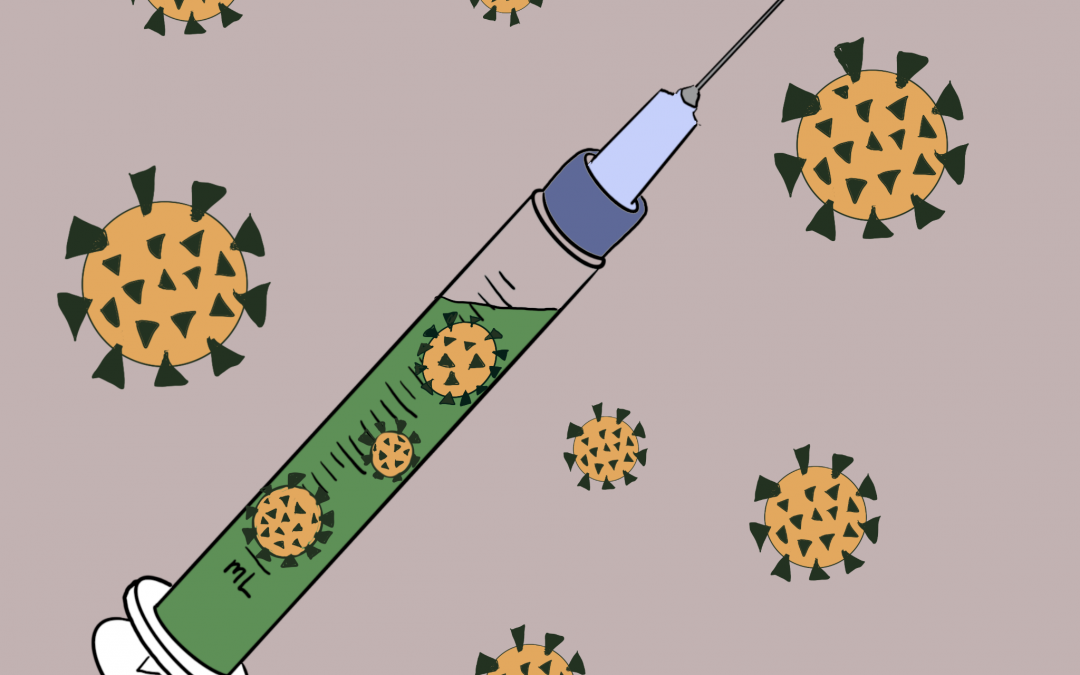
Jun 7, 2020 | Front Page News, Investigative, Noah Bergam
By Noah Bergam (V)
The first night my dad came home from treating COVID-19 patients at Newark Beth-Israel Hospital, I asked him what the situation looked like.
His immediate response: “No one knows anything.”
Ground zero, according to him, was a welter of confusion. In the midst of a growing influx of cases and a narrowing supply of masks and ventilators, it made sense: no one working there had seen or been prepared for this kind of situation before.
The situation at the hospital has since improved, but confusion has continued to sweep the entire population as we realize the power of our quarantine, and the fact that, if we break it, we risk restarting a vicious battle on the front lines.
We have a long road ahead of us, and we’re all looking forward to the day when we can walk away from this pandemic. But when will that day be? How do we reach it? And how do we make sure this never happens again?
These are the core questions I seek to address in this investigation.
Beating COVID-19
To truly put down the virus at this point, we have to reach a status called herd immunity.
Herd immunity occurs when a significant majority of the population (about 70%) have been exposed to the virus, developed antibodies, and reached a point where they are no longer contagious. This creates a situation where those who cannot survive the virus (i.e. the immunocompromised) are surrounded by a “herd” who can act as a buffer from outbreaks. Life can then go on as normal.
Herd immunity can either happen naturally or artificially (i.e. through a vaccine). According to the WHO, “there is not enough evidence” to suggest that surviving COVID-19 will naturally grant long-lasting immunity. But even with that assumption, the death rates we have seen so far suggest that it might take well into 2021 and over half a million American deaths before we reach that point, according to Johns Hopkins Coronavirus Resource Center.
And then there is a vaccine––a scalable treatment that can give someone a “dumbed down” version of the virus and allow their immune system to develop the necessary antibodies to protect themselves. If we develop a vaccine, it can accelerate us to herd immunity with much more certainty than the natural route.
If.
The vaccine time-table we have been hearing from government officials, like Dr. Anthony Fauci, is 12 to 18 months, which would have us waiting through mid-2021 … but there’s no guarantee that we will remotely follow this timeline, or that we will even be able to develop one. And if we do, we will have to develop a much stronger global supply chain to satisfy an exceptional demand.
In any case, we have a long road ahead of us. But that doesn’t mean we won’t progress. Reopening the economy can happen in steps; Governor Murphy has outlined a six-part plan that includes gradual reopening of specific businesses, as well as significant expansion of contact tracing and testing.
Beating Future Outbreaks
The position we find ourselves in reflects what I like to call the Fundamental Theorem of Public Health: the fact that ad hoc treatment is a more expensive and more painful alternative to prevention.
Keyword is prevention. How do we prevent a virus from wreaking this kind of havoc in the years to come?
To get answers, I talked to my sister Scarlett Bergam, a candidate for a Master’s Degree in Public Health with a concentration in Global Infectious Disease at Brown University.
One of the main things she stressed was quicker action. When asked what contributed most to the situation at hand, Scarlett pointed to a lack of testing and the ramifications thereafter. “While this was not completely in our control, it led to many people infecting others without knowing. To combat the inevitability of not knowing who was infected, we should have shut down our economy much sooner.“
It’s important to understand that testing alone is not enough––those who test positive need to immediately be isolated from the general population, as well as those who they came into contact with in the meantime. Hence, contact tracing: a tool that, if used on a wide enough scale, can turn a virus’ growth rate upside down.
According to Scarlett, “This would be incredibly efficient if people consented to it. However, ethically, there is always a fear of giving up one’s data.” She acknowledged the fact that most contact tracing would probably have to include GPS information, and that tracking of people’s locations could discourage signups (mandatory contact tracing, of course, would invoke some hefty constitutional issues).
However, she expressed some faith that a partnership between local government and the private tech industry could maximize both the effectiveness and the appeal of contact tracing. (Additionally, I found in my own research some clever methods of contact tracing that wouldn’t impede privacy.)
In terms of what we need to do to make these systems a reality, Bergam stated that “policy definitely has the biggest impact—new laws and funding allocation have the power to save mass amounts of lives, much more efficiently than any one doctor can.” Ultimately, making these kinds of long-term investments can save a lot of money and life down the line, and if there’s one good thing that COVID-19 has given us, it’s the amount of incentive we now have to follow through.
Conclusions
It’s incredibly scary to not know when life will go back to normal.
We can rest assured that one day it will. But in order to reach that day, we need solutions, widespread cooperation, and, perhaps most importantly, knowledge. “No one knows anything” is a scary prospect in the hospital but also in the general population––we need to understand the science and the policy surrounding this pandemic. We cannot afford to fall for misinformation, political understatements, or the illusion of blissful ignorance.
We are living in a time of historical proportions, with historical mistakes that will be studied for decades and centuries to come.
So let’s be clear on our situation, and the solutions at hand. Let’s face this world head on and come back to our changed world, not defeated by this present suffering, but empowered by the future in our hands.







